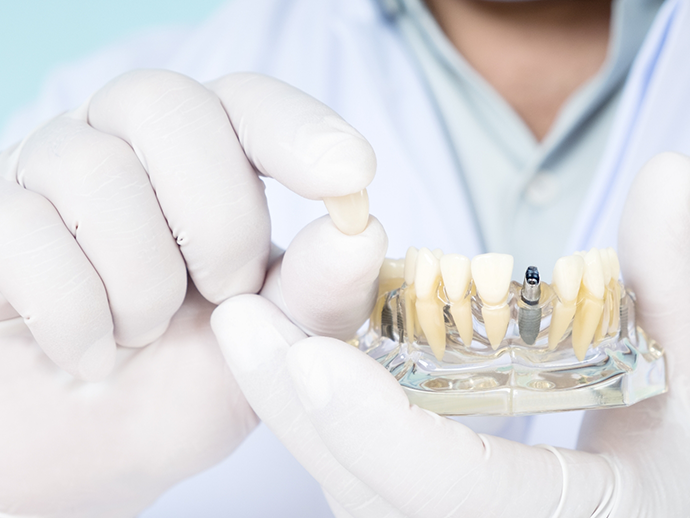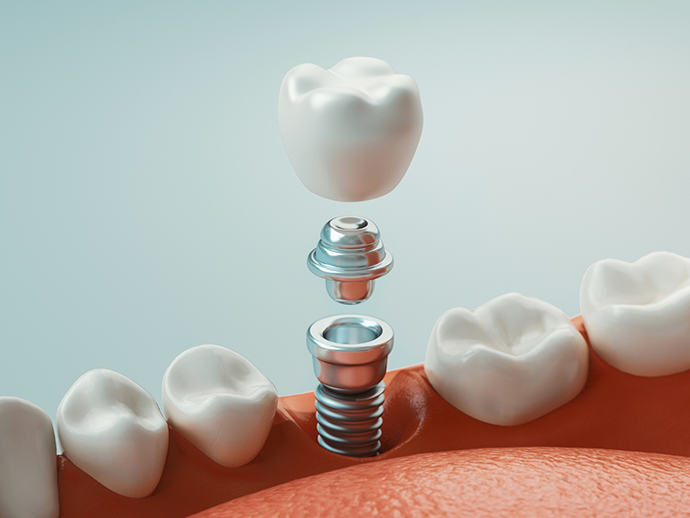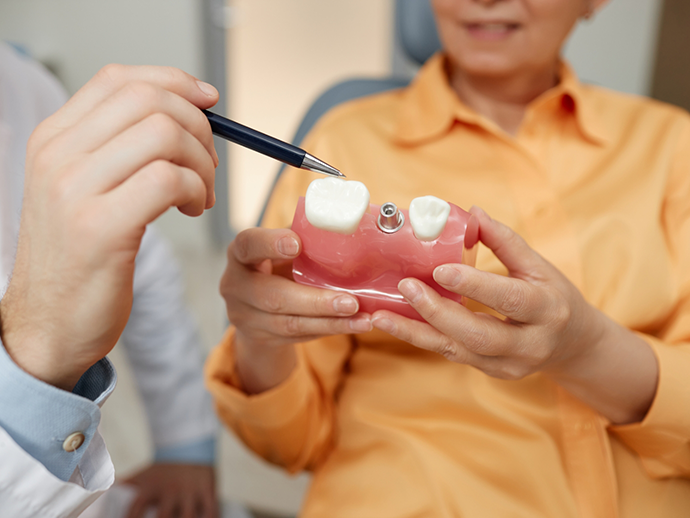Dental Implants Bethlehem
Superior Prosthetics Designed to Last a Lifetime
Why Choose Penn Dental Arts for Dental Implants?
- In-House Dental Implant Process - No Referrals Required
- Dental Patient Comfort Comes First
- 3D Imaging Used for Accurate Dental Implant Placement
What Are Dental Implants?

Instead of using prosthetics that sit atop the gums and require the alteration of healthy teeth, we can place titanium dental implant posts into your jawbone for maximum support and stability. Once fused with the surrounding bone, a dental crown, bridge, or denture can be secured on top, delivering a new and improved aesthetic and oral function that promotes better oral health.
The 4-Step Dental Implant Process

Getting dental implants is a straightforward process when guided by an experienced professional like Dr. Smith. Our team ensures your comfort and success every step of the way. From the initial consultation to the final placement of your new teeth, we’ll provide expert care and clear communication, so you always know what to expect. Read on to learn more about how we can restore your smile with dental implants in Thornville.
Initial Dental Implant Consultation

Your dental implant journey begins with a comprehensive consultation with Dr. Smith and our skilled team. Using our advanced CT cone beam scanner, we’ll capture detailed 3D images of your mouth, allowing us to examine your jawbone, sinuses, and nerves. This technology ensures precise planning and confirms that you’re a good candidate for implants.
During this visit, we’ll also discuss your goals, answer your questions, and create a personalized treatment plan. By the end of your consultation, you’ll have a clear understanding of the process and what to expect at each stage of your smile transformation.
Dental Implant Surgery

Once your treatment plan is finalized, the next step is dental implant surgery. Dr. Smith will carefully make small incisions in your gums to place the implant posts into your jawbone at the precise locations determined during your consultation. This procedure is performed with your comfort in mind, using local anesthesia or sedation if needed.
After placing the implants, we’ll provide you with aftercare instructions to ensure a smooth healing process. Rest assured – most patients find the surgery more comfortable than they expected.
Dental Implant Osseointegration & Abutment Placement

Following surgery, a healing period of three to six months is needed to allow the implants to fuse with your jawbone via a natural process called osseointegration. This step is essential for creating a stable foundation for your new teeth.
Once your implants have fully integrated, you’ll return to our office so we can place small connector pieces called abutments onto the implants. These abutments will securely hold your final restorations in place. We’ll ensure everything fits properly and that your gums heal comfortably around these attachments.
Delivery of Dental Implant Restorations

The final step in your dental implant process is receiving your custom-crafted replacement teeth. Once your gums have healed from the abutment placement and your permanent restorations are ready, we’ll invite you back to our office. Dr. Smith will carefully attach your new teeth to the abutments, making sure they look natural and feel comfortable.
After some final adjustments, your smile will be complete! With your new dental implants, you’ll enjoy restored function, appearance, and confidence. You’ll be ready to eat, speak, and smile with ease once again!
Benefits of Dental Implants

Because of their unique design, dental implants have many unique benefits to offer patients. We understand how important it is to get a snapshot of what your life will look like with your new teeth, so we put together some information about the advantages of dental implants. Keep reading to see how they could impact you!
Day-to-Day Benefits

You’ll start to see the difference dental implants can make on your daily life almost immediately. Once your restoration is firmly in place, you’ll be able to enjoy:
- A flawless smile. Dental implants are made from quality, tooth-colored materials. When crafted by our experts in Bethlehem, your smile will look seamless and perfectly natural.
- More food options. Since they’re anchored to your jawbone, dental implants are much stronger than other restorations. You’ll be able to eat all of your favorite foods with little-to-no restrictions.
- Easy speech. Dental implants look natural, and they feel natural too. You’ll have no trouble talking smoothly and efficiently with these replacements filling your dental gaps.
- Streamlined oral hygiene. Dental implants are very easy to take care of. Simply brush and floss them like you would for natural teeth!
Health Benefits

In addition to practical benefits, dental implants also provide several health advantages. For example, they’ll:
- Preserve your jawbone. Did you know that tooth loss can lead to jawbone deterioration? Without a dental root anchored to the bone, your jaw misses out on essential stimulation and can’t get what it needs to grow. Dental implants can provide this stimulation, effectively preserving your jawbone and oral structure.
- Prevent dental drift. When there are gaps between your teeth, your pearly whites will likely shift and become crooked in order to compensate. A replacement like dental implants prevents this from happening.
- Improve your nutrition. Thanks to your expanded menu options, it will be much easier to eat a balanced and nutritious diet!
Long-Term Benefits

Possibly the best part about dental implants is their longevity. They’re an incredibly durable restoration, capable of lasting for several decades with proper care. Not only will you be able to enjoy these benefits for years to come, but you’ll also save money by not needing frequent replacements or repairs. Now that’s the best of both worlds!
Maintaining & Caring for Your Dental Implants

Today's dental implants are the gold standard of tooth replacement, as they can keep your smile healthy, strong, and whole for a lifetime. Even so, you'll still need to be diligent; the posts will only work well when given regular (and good) maintenance. That's why Penn Dental Arts is here with tips on dental implant care in Bethlehem! To learn about these tricks in detail, simply continue reading or contact us in the coming days.
Make Oral Hygiene a Priority

While dental implants aren’t “real” teeth, they need a healthy mouth to work. Being near cavities and infected gums makes them unstable, leading to a higher risk of failure. The latter issue is especially grave, as gum disease can loosen implant posts until they fall out.
You can avoid such problems by making oral hygiene a priority. After all, twice-daily brushing and once-daily flossing prevent tooth decay, gum disease, and similar oral issues. That means they should keep your mouth strong and stable for your implant posts.
Eat a Healthy Diet

Though they can restore your bite force, dental implants don’t handle junk food well. Sticky and sugary products like candy, caramel, and other treats often wedge between the posts. In doing so, those “leftovers” can quickly cause cavities and gum disease that make your implants fail.
Of course, junk food won’t be a problem if you follow a mouth-healthy diet. Eating meals rich in phosphorus, calcium, and vitamin C would strengthen your jaw and keep your gums healthy. Better yet, they won’t feature sticky sugar that could get wedged near your implants.
Break Bad Habits

Even dental implants can fail due to poor oral habits, despite their durability. It follows that you should quit (or avoid) such practices as soon as possible.
Several notable oral habits are known to cause implant failure. For example, tobacco use can delay treatment recovery, infect your gum tissues, and more. Chewing hard objects like fingernails is also bad for your teeth, as doing so may cause breaks. The resulting chips and fractures would then lead to a failed treatment.
Protect Your Dental Implants

Although they're made of sturdy titanium and porcelain, dental implants can still break under extreme force. You’ll need to protect them from accidents to ensure their safety.
In general, the best protection for dental implants is a custom mouthguard. Using one for sports would shield your posts from collisions, tackles, and other injuries. On the other hand, a nightguard would keep you from grinding your teeth while asleep.
Schedule Regular Dental Checkups

Even if you brush and floss daily, you can’t maintain your dental implants alone. You should get help by attending regular dental checkups with your dentist.
Dental checkups remain the best form of preventive oral care today. By attending them often, your dentist can diagnose (and treat) smile issues before they threaten your implant posts. It’s just a matter of scheduling the visits every six months or so.
